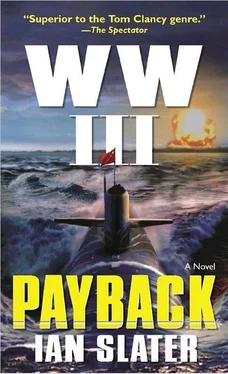Freeman, belying his own penchant for the more relaxed Special Forces style, immediately stood to attention, conveying such ramrod alertness, as well as his runner’s all-round fitness, that he looked no older than a man in his mid-forties. It was the kind of transformation into a younger self, Patricia Grant mused, that one achieves in the moment of pleasant surprise — meeting an old flame, high school reunion — especially when it involved the kind of ego boost that everyone experienced in the presence of the most powerful leader on earth. The FBI agent realized she too had unconsciously straightened up. Freeman saw a note, presumably slid in from off camera by an aide. Perhaps it was Eleanor, if she was still on her feet.
“Agent Grant,” said the Chief Executive, flashing a smile at the redhead.
“Yes, Mr. President.”
“Thank you for bringing in General Freeman. He’s on our most-wanted list.”
It was a nice comment, simultaneously putting everyone at ease and making the subsequent presidential request that Patricia Grant leave the room sound more like she would be doing him a favor than obeying an order.
“Take a seat,” the President invited Freeman. “Eleanor says you’ve been very helpful corroborating our security agencies’ identification of the types of weapons used in those three terrorist attacks.”
Corroborating, thought Freeman. He’d told the White House precisely, albeit through Eleanor, what two types of MANPADs had been used, the same types that would no doubt be used again if the U.S. didn’t go after the terrorist base from which they came.
“Well, Mr. President,” Freeman responded, at least trying to strike a middle ground between his ego and respect for the Chief Executive Officer of the United States, “we know they used a Vanguard 3D MANPAD and an Igla-2C, but I wouldn’t vouch for the third.”
“Ah,” interjected the Air Force Chief of Staff, Lesand, whom the teleconference cam now showed was sitting to the right of the President, “the third missile was a Stinger, Douglas. Launcher’s not in hand at the moment but we’re pretty sure its MID will be one of those missing from our Afghan Donation List.” Donation! Freeman could barely subdue his disdain for such euphemisms — donation! In the late eighties the U.S. had given the mujahideen scores of the missiles to kill Russians. Nor did Freeman like Lesand’s use of “Douglas.” The Air Force guy was a Johnny-come-lately, had seen one war — against the Iraqi Air Force, which wasn’t there — and now it was Douglas. To Freeman, the flyboy was sounding like one of those overly familiar teenaged doctor’s receptionists who start right off calling you by your first name — we’re all buddies. You could run a small Special Forces team like that. Indeed, he had done so in the past, but let Michael try running his Air Force on a first-name basis.
“Ah, how do you know the missing launcher belonged to a Stinger, Mike ?” asked Freeman.
Eleanor Prenty, the fatigue bags under her eyes looking even worse on the TV screen, was still trying to appear calm — after thirty-six hours without sleep — but inside she was on the boil. Freeman, she knew, wanted, ached, to be recognized for his ability rather than being shunted aside, like so many, by mandatory retirement rules and regulations which all too often assumed you became brain-dead at an arbitrarily, bureaucratically imposed age. But his combatively delivered “Mike,” Eleanor knew, was precisely the kind of petulance that quickly shifted people’s attention away from the kind of respect Freeman had earned on the battlefield to his reputation as a diplomatic disaster.
“The videos we’ve seen, General,” the Chief of Naval Operations told Freeman, “and the several eyewitnesses we’ve spoken to so far would seem to indicate pretty conclusively that the missile in question was a Stinger. The twin rectangular flap-ears antenna and—”
“ ‘ Seem to indicate’ is the operative phrase, Admiral,” cut in Freeman. “Now, I’m no flight engineer like Mikey here, and the flight angle on those videos may make it look like it’s a boxy antenna, a Stinger, that we’re seeing, but it could be another enemy-made MANPAD.” He was recalling what Aussie Lewis had said about the similarity of the Stinger antenna to that seen on the missile in the Dallas/Fort Worth video. The missile that Mikey Lesand and the admiral were convinced was a Stinger could well be an improved Chinese Anza.
“How about the eyewitnesses, General?” retorted the CNO, the President, listening intently, giving no indication how much this Stinger/non-Stinger debate counted in what would ultimately be his decision following the Joint Chiefs’ and his National Security Advisor’s input.
“These eyewitnesses,” asked Freeman, “civilian or military?”
“Civilian, I believe,” answered Eleanor crisply.
“Not worth a damn,” said Freeman. “They’re not trained.”
“One was a member of the press,” the CNO retorted.
“Huh!” grunted Freeman, sitting back in exasperation, but in what Eleanor, her nerves frayed, was afraid might look like plain insolence to those in the Oval Office.
“Media types are even worse than civilians,” continued Freeman. “If I had a dime for every time some correspondent called an armored car or a Bradley a tank, I’d be a wealthy man. The State Department’s made serious foreign-policy blunders believing some radio report of enemy ‘tanks’ invading some foreign burg.”
“So, General,” cut in Eleanor, her no-nonsense tone reinforced by her stony stare into the Oval Office’s camera, “some witnesses make mistakes. But let’s get back to the point, shall we? Even if this third rocket, MANPAD, or whatever you call the thing that murdered over three hundred Americans at Dallas, is a Stinger, the CIA tells us the launchers we’ve found for these—” She glanced down at her notes. “—Vanguard and Igla, both come from the same source. North Korea, a place called Kosong.”
“Yes,” said Freeman, charmingly agreeable, as if he’d known the name of the place all along. “Kosong.”
“Good!” said the President, relieved by Freeman’s unqualified concurrence with his Joint Chiefs of Staff.
“I just don’t want you guys to go into Kosong,” said Freeman, “and have the attack get into trouble because of incomplete CIA intel, Mr. President.”
The Joint Chiefs were trying to conceal their surprise with, and their resentment of, Freeman. The gall of the man! How in hell did he know they had already decided on an attack, before the suggestion had been finalized, the CNO in particular noting that Freeman had said the attack, not an attack, as if the self-assured son of a bitch could read their minds.
“I just thought it prudent,” Freeman continued, “that it should be a matter of record for the administration that, if anything was to go wrong with the mission, the White House had to act on the incomplete information it had at the time, but with due deliberation. Like the allied attack on Iraq. The WMDs.”
The general’s phrase, “incomplete information,” and his mention of WMDs, the supposed weapons of mass destruction in Iraq, produced dead air in the Oval Office, the silence pregnant with the WMD nightmare.
“You think,” said the President in a tone of deceptive calmness, “we should wait — try to find the third missile’s remnants? We already have the three launchers and their MIDs.”
The President and the Joint Chiefs were expecting the usual unequivocal answer from the no-holds-barred general, but instead Freeman replied, “I don’t know, Mr. President. I’m a soldier, not a politician — and I say that with respect, sir, for you and the awesome responsibility you have.” And the general meant it. He was thinking. He habitually railed against government ineptness as much as any other taxpayer in the country, but he was too smart not to know how different a politician’s lot was, trying to legislate in a sea of competing interests.
Читать дальше












